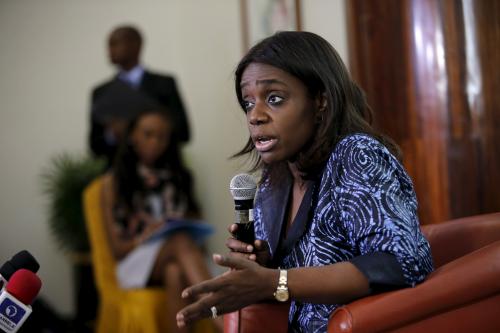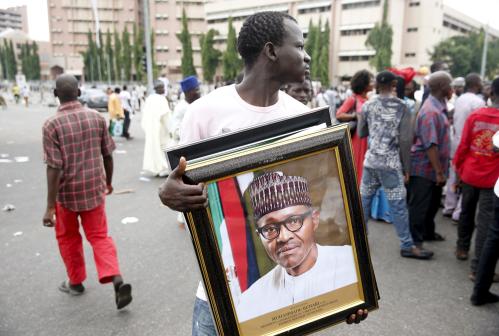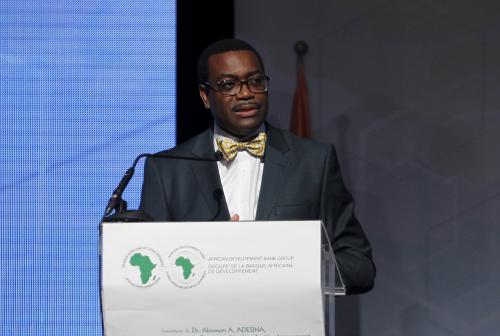President Buhari takes office in Nigeria
Muhammadu Buhari was sworn in as the Nigerian president in Abuja today. The inauguration ceremony was attended by U.S. Secretary of State John Kerry and South African President Jacob Zuma, among other regional leaders. Once the celebrations are over, however, the newly sworn-in president has a massive agenda that awaits him. Government revenues are on the decline, the naira currency has weakened, military insurgency in the north continues, and the economy is slowing down. In his first speech as president, Buhari highlighted these issues and admitted that the economy is in “deep trouble.” He also reassured the crowd of his commitment to tackle Boko Haram.
However, it wasn’t just the inauguration that kept Nigeria in the spotlight this week: The country also faced a crippling oil shortage, despite Nigeria being Africa’s largest oil producer, as a result of strikes from national fuel marketers and unions. Analysts have also blamed a corrupt and costly fuel subsidy scheme for this week’s crisis.
The country nearly ran out of oil and suffered widespread power outages, a steep contraction in business activity, and changes to airline schedules—making it one of the worst oil crises in the country’s history.
African Development Bank annual meetings bid President Kaberuka farewell and welcome President-elect Adesina
From May 25 to 29, the African Development Bank (AfDB) held its 50th annual meetings in Abidjan to not only celebrate its 50th anniversary, welcome South Sudan as a member, bid farewell to outgoing President Donald Kaberuka, and elect the institution’s next president, but also discuss the continent’s greatest challenges and opportunities during this exceptional moment in the AfDB’s history.
On Monday, the AfDB released its African Economic Outlook 2015 report, which estimates that the continent will achieve high, yet uneven GDP growth at 4.5 percent in 2015, with East and West Africa’s economies expanding by at least 5 percent in 2015, while Southern Africa, constrained by low growth in South Africa, will only reach 3.1 percent growth. It also revealed its new Gender Equality Index, which measures the status of women’s economic, political, and civic power in 52 out of 54 African countries in order to inform policymakers on the state of gender equality in their societies. Other high-level sessions offered throughout the meetings focused on a broad array of topics, including inclusive growth, migration and labor mobility, African health care systems, climate change, and financing for development.
On Thursday, after several hours of deliberation, the AfDB’s Board of Governors elected a new president, Dr. Akinwumi Adesina, from among eight candidates vying for the position. Dr. Adesina served as Nigeria’s agriculture minister under President Goodluck Jonathan’s administration and has been recognized for spearheading “Nigeria’s agricultural revival”—namely increasing its food production by 22 million tons, reducing the country’s food imports bill, and creating new employment opportunities in the agricultural sector.
Although many analysts have credited Kaberuka with sound leadership over the course of his tenure as president, as President-elect Adesina takes office in August, he will still face a number of challenges, including low oil prices and political instability on the continent, as well as growing demands for accountability from shareholders and a competitive development finance landscape.
Madagascar moves towards impeaching its president, and elections raise questions in Burundi and Ethiopia
On Wednesday, Madagascar’s parliament voted to dismiss President Hery Rajaonarimampianina for alleged violations of the constitution, ranging from corruption charges to religious biases to “general incompetence.” President Rajaonarimampianina was elected in 2014, after five years of political unrest that followed the 2009 ousting of former president, Marc Ravalomanana. If the impeachment proceeds as expected, many analysts argue that the country’s political stability will be at risk once again. President Rajaonarimampianina has denied allegations of corruption and has reiterated the need for calm during this time.
Recent developments in the Burundi crisis are raising doubts over the upcoming parliamentary and presidential elections, set be held June 5 and June 26, respectively. As the Burundi elections draw closer, the European Union has decided to suspend its election monitoring mission there due to restrictions on the media, excessive use of force against demonstrators, and the mounting climate of intimidation. The Catholic Church has also withdrawn support for the elections. Similarly, members of the U.N. Security Council have stated that the Burundi elections should not take place “as scheduled.” On Saturday, May 23, a Burundian opposition leader was killed along with his bodyguard in a drive-by shooting.
Last Sunday, Ethiopia held its parliamentary and regional elections. The preliminary results show the ruling party has won all 442 seats declared thus far. The winner of the remaining 105 seats is yet to be announced. Though some opposition leaders have hinted at the existence of irregularities, observers from the African Union have defined the Ethiopian elections as “credible.”





Commentary
Africa in the news: New presidents for Nigeria and the AfDB, while Burundi, Ethiopia, and Madagascar contend with other political transitions
May 29, 2015